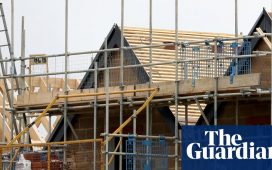The rout in the real estate market has presented an opportunity for long-term investors, according to UBS. Real estate is the only one of 11 main groups in the S & P 500 that has fallen in 2024, sliding 4.7%. Significant uncertainty remains in the commercial real estate, or CRE, market, including the path of interest rates and questions about refinancing $2 trillion in debt maturing between 2024 and 2026, UBS analyst Jonathan Woloshin wrote in a note last week. However, capital remains available and the diminishing supply of new retail, multifamily and industrial real estate points to stronger operating fundamentals in 2025 through 2030, he said. There is also money sitting on the sidelines in the private equity market and about $33.5 billion in new CRE funds have been announced, he added. .SPLRCR YTD mountain S & P 500 Real Estate Sector year to date Real estate investment trusts , or REITs, also pay attractive dividends, with an average yield of 4.2%, according to UBS. “Investors need to remember that no one rings a bell at the bottom,” Woloshin wrote. “Although headlines are likely to remain negative and more challenges will persist in CRE, we believe patient investors with liquidity and a multi-year time horizon have a plethora of attractive risk-adjusted reward opportunities available in the CRE and REIT market.” He strongly recommends focusing on quality — such as management, balance sheet, properties, geographies and dividend-to-free cash flow coverage — instead of reaching for yield. Here are two of the REITS on his list: Shares of Prologis have struggled this year, down about 15%. However, the REIT is the world’s largest owner of industrial properties, such as warehouses — and the industrial sector remains strong, Woloshin said. “PLD has a four-prong operating model consisting of owned and operated real estate, development, profit potential for its Essentials Business and strategic capital management that provides multiple avenues of value-creation potential,” he said. Prologis also pays a 3.4% dividend yield. Alexandria Real Estate Equities yields 4.4% and is down more than 7% year to date. The company owns, operates and develops large campuses for life science companies. Woloshin likes Alexandria Real Estate Equities’ strong balance sheet and its limited near-term debt, as well as its well-covered dividend and broad access to capital. “ARE has a demonstrated history of developing assets that are strongly pre-leased and has a well-diversified, strong credit tenant base,” he said.









